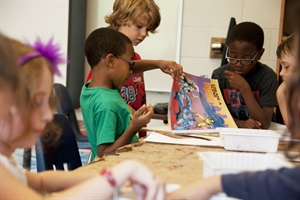Sat 06 November 2021
View all news

Youth and public empowerment day
23 countries made national climate education pledges including net zero schools and putting climate at the heart of their national curriculums as young climate leaders joined ministers and senior figures in Glasgow.
Meanwhile, the 167th school strike took place with between 20,000-30,000 people marching through Glasgow to hear Greta Thunberg and others describe COP26 as a failure, despite the fact that the conference is only at its mid-point.
Official events across COP26 focused on harnessing the expertise of young people and putting their views directly to the negotiators and officials working to agree global action on climate change.
The UK also announced a draft Sustainability and Climate Change strategy which is intended 'to equip and empower young people with the skills they need to drive the future of climate action'.
Education Ministers from around the world also pledged to do the same with nations such as, South Korea, Albania and Sierra Leone pledging to put climate change at the heart of their curriculums.
The UK plan says teachers will be supported to deliver world-leading climate change education through a model science curriculum, which will be in place by 2023, to teach children about nature and their impact on the world around them.
Children and young people will also be encouraged to get involved in the natural world by increasing biodiversity in the grounds of their nursery, school or college.
A new 'Climate Leaders Award' will help children and young people develop their skills and knowledge in biodiversity and sustainability, and celebrate and recognise their work in protecting the local environment. Pupils and students will be able to progress through different levels of the award, ‘bronze’, ‘silver’ and ‘gold’, in a similar way to the Duke of Edinburgh Awards.
UK Education Secretary Nadhim Zahawi said: "Empowering teachers in every school to deliver world-leading climate change education will not only raise awareness and understanding of the problem, but also equip young people with the skills and knowledge to build a sustainable future."
Zahawi also confirmed plans to test innovative new Energy Pods that can replace gas and coal boilers and supply all a school’s heating and hot water without any carbon emissions. These are being tested first in some schools and then could be rolled out to other public sector buildings.
‘Energy Pods’ are a low to zero carbon 'plug and play' technological solution which provide heating and hot water to existing school settings via solar panels and technology to maximise their output.
From December 2021, all Further Education (FE) teachers trained via an apprenticeship will be required to integrate sustainability into their teaching, through modelling sustainable practices and promoting sustainable development principles in relation to their subject specialism.
These measures, brought together in a draft sustainability and climate change strategy, to be built on over the next 6 months in collaboration with young people, educators, sustainability experts and environmentalists before the final publication of the strategy in April 2022.
Photo credit: https://unsplash.com/@cdc
Related Links
< Back to news list